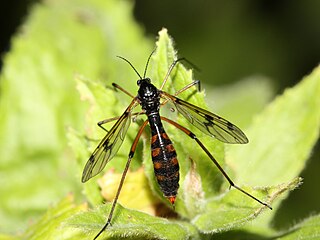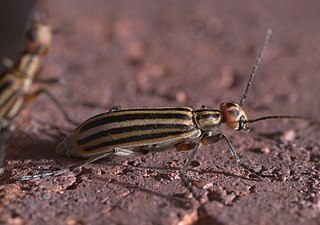
The Ptychopteridae, phantom crane flies, are a small family of nematocerous Diptera. Superficially similar in appearance to other "tipuloid" families, they lack the ocelli of the Trichoceridae, the five-branched radial vein of the Tanyderidae, and the two anal veins that reach the wing margins of the Tipulidae. They are usually allied with the Tanyderidae based on similarities of the mesonotal suture, this group being called the Ptychopteromorpha.

Cephalanthus occidentalis is a species of flowering plant in the family Rubiaceae that is native to eastern and southern North America. Common names include buttonbush, common buttonbush, button-willow, buck brush, and honey-bells.

Corte Madera Creek is a short stream which flows southeast for 4.5 miles (7.2 km) in Marin County, California. Corte Madera Creek is formed by the confluence of San Anselmo Creek and Ross Creek in Ross and entering a tidal marsh at Kentfield before connecting to San Francisco Bay near Corte Madera.

Senna occidentalis, commonly known as coffee senna, styptic weed, or septicweed, is a species of flowering plant in the family Fabaceae and is native to the southern United States of America, Mexico and South America. It is a shrub with pinnate leaves, with three to seven pairs of broadly elliptic to egg-shaped leaflets, and yellow flowers arranged in groups of two to four, with six fertile stamens in each flower. It is an aggressive, pantropical weed.

Dasymutilla occidentalis is a species of parasitoid wasp that ranges from Connecticut to Kansas in the north and Florida to Texas in the south. Adults are mostly seen in the summer months.

Clusia occidentalis is a species of fly in the family Clusiidae. It is found on the west coast of Canada and the United States of America, where it is the only known species of Clusia.

Orasema occidentalis is a species of chalcid wasp in the family Eucharitidae. The species is a parasite of Pheidole desertorum.

Bittacomorpha is a genus of phantom crane flies in the family Ptychopteridae. There are about 11 described species in Bittacomorpha.
Stizus occidentalis is a species of sand wasp in the family Bembicidae. It is found in North America.

Polyphylla occidentalis is a species of scarab beetle in the family Scarabaeidae. It is found in North America.
Phrictopyga occidentalis is a species of delphacid planthopper in the family Delphacidae. It is found in the Caribbean, Central America, North America, and South America.

Graphoderus occidentalis is a species of predaceous diving beetle in the family Dytiscidae. It is found in North America.
Ischyropalpus occidentalis is a species of antlike flower beetle in the family Anthicidae. It is found in Central America and North America.
Proctacanthus occidentalis is a species of robber flies.
Strangalia occidentalis is a species of flower longhorn in the beetle family Cerambycidae. It is found in Central America and North America.

Epicauta occidentalis is a species of blister beetle in the family Meloidae. It is found in North America.
Okanagana occidentalis is a species of cicada in the family Cicadidae. It is found in North America.
Stenelmis occidentalis is a species of riffle beetle in the family Elmidae. It is found in Central America and North America.

Eurhoptus is a genus of hidden snout weevils in the family of beetles known as Curculionidae. There are at least eight described species in Eurhoptus.

Martino's mole is a species of small blind mole in the family Talpidae found in eastern Thrace along the western Black Sea coast in south-eastern Bulgaria and north-eastern Turkey, mainly in the Strandzha mountain range. In Bulgaria it is found in Strandzha Nature Park. Martino's mole is named in honour of the couple Evgeniya and Vladimir Martino, key earlier Balkan mammalogists.












